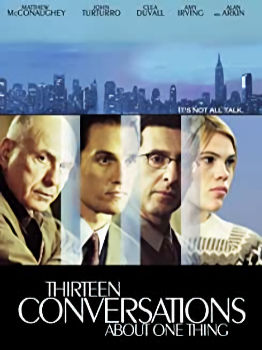THIRTEEN CONVERSATIONS
ABOUT ONE THING
Released: 2001
Directed by: Jill Sprecher
Written by: Karen & Jill Sprecher
Cast:
Alan Arkin: Gene English
Matthew McConaughey: Troy
John Turturro: Walker
William Wise: Wade Bowman
Clea DuVall: Beatrice
Amy Irving: Patricia
Barbara Sukowa: Helen
|

|
Review by A. O. Scott, The New York Times
Tangled Up in the Laws of the Universe, if There Are Any
Like its title, Jill Sprecher’s Thirteen Conversations About One Thing is both straightforward and enigmatic: four fables of modern urban dissatisfaction woven into a fabric whose pattern is enchantingly elusive. What, for instance, is the “one thing” this collection of morose New Yorkers is supposedly talking about? It seems intuitively identifiable but strangely resistant to precise definition. Synonyms multiply by the dozen: chance, fate, coincidence, serendipity, the order of the universe—or, to give some human dimension to these chilly mathematical conceits: happiness, good fortune, kismet, grace, the meaning of life.
There are no coincidences. The tiniest actions have unforeseen and dramatic consequences. Time is not a straight line but a tangle of contingencies. Perfect strangers are connected by webs of happenstance like subatomic particles governed by invisible forces. Such notions have in various ways been the subject of at least 13 movies in the last decade, from Pulp Fiction to Magnolia, from Sliding Doors to Amélie. But Ms. Sprecher, who collaborated on the script with her sister, Karen (with whom she also wrote her first film, Clockwatchers), executes an unusually smart and intelligent variation on these familiar themes. Her lucid framing and graceful, deliberate pacing lift the movie above the pop mysticism of its conceit. Events that might otherwise seem like clichés—a winning lottery ticket, a car accident, a glance through the windows of a subway car, a classroom discussion of entropy—become haunting, teasing surprises.
The structure of Thirteen Conversations, whose title gestures toward a Wallace Stevens poem about how the world is at once made and misconstrued by our perceptions of it, is a crafty puzzle. We are introduced to a series of characters whose conversations brush up against the petty superstitions that govern daily life. A physics professor (John Turturro) and his wife (Amy Irving) share a desultory meal. A cocky young prosecutor (Matthew McConaughey) and a glum older fellow (Alan Arkin) pursue a barroom debate about luck, guilt and happiness, for which their own lives turn out to be evidence. The older man is a midlevel insurance executive tormented by his parental failings and the irrepressible optimism of one of his underlings. The lawyer, full of lofty ideas about crime and punishment, soon finds himself wracked by guilt in the aftermath of a hit-and-run accident. Meanwhile, a young housecleaner (Clea DuVall) floats angelically through her days of menial work, convinced that her life is part of a benevolent and mysterious design.
But meanwhile is not exactly the right word. Like a number of other young directors—examples include Quentin Tarantino (Pulp Fiction), Christopher Nolan (Memento) and Tom Tykwer (Run Lola Run)—Ms. Sprecher uses the cinematic illusion of sequentiality to keep us off balance. In other words, we assume that the chronological order we experience while watching a movie corresponds to the order of events taking place on screen, and we persist in this assumption even as the unfolding movie subverts it, looping forward and backward as it shuttles from story to story. The Sprechers’ sensibility is literary; their movie evokes the brain-teasing modernism of writers like Jorge Luis Borges, Italo Calvino and Paul Auster. But Jill Sprecher’s conception of form is, ultimately, musical. Watching Thirteen Conversations is a bit like listening to a Schubert piano sonata: you perceive, at the far boundary of consciousness, echoes and foreshadowings, and you encounter, always by surprise and always in retrospect, at exactly the right moment passages of intense and ravishing emotion.
“The laws of the universe are absolute,” the professor briskly tells his class, but these laws are vexing and slippery as they apply to human relationships. The professor himself has abandoned his wife for a colleague (Barbara Sukowa) whom he treats almost as an abstraction, a manifestation of the idea that he wants more out of his life. The other characters in the film are similarly propelled by impulses they hardly understand, and Ms. Sprecher’s sleight of hand makes them seem at once creatures of stubborn free will and impotent pieces in a cosmic game of checkers.
They are, in effect, the punch lines to a series of philosophical jokes, but the filmmakers and the actors never lose sight of their humanity. Mr. Arkin, whose character is the most self-aware and, almost as a consequence, the least, gives one of his deepest, most sustained performances in years. Going back to Catch-22, he has had an unequaled knack for playing fatalists at war with their own fatalism, and here he is weary, angry, proud and very funny without ever raising his voice above its careful monotone or lifting his eyes off the ground.
The quiet naturalism of the acting balances the artifice of the script and the almost finicky precision of Ms. Sprecher’s frames, in which no detail is wasted or left to chance. Thirteen Conversations is thrillingly smart, but not, like so many other pictures in this vein, merely an elaborate excuse for its own cleverness. As you puzzle over the intricacies of its shape, which reveal themselves only in retrospect, you may also find yourself surprised by the depth of its insights.
